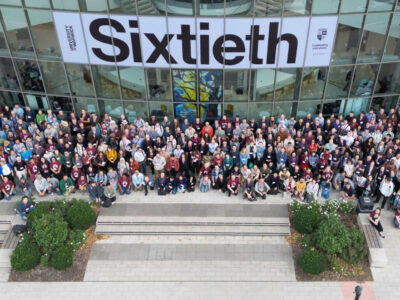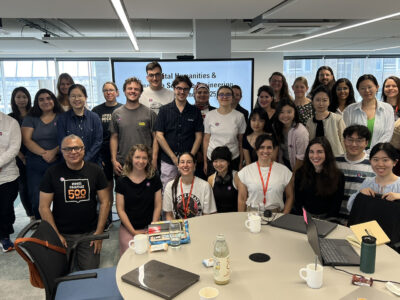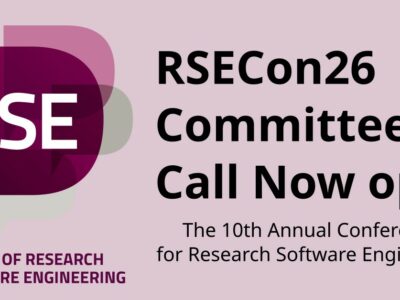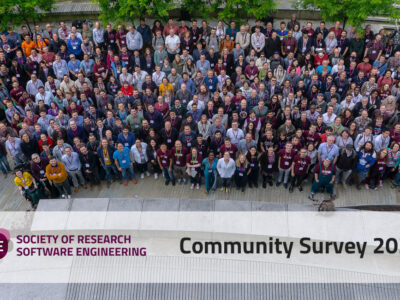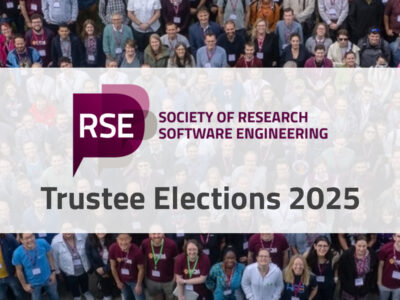Weather and Climate RSECon24 Birds of a Feather Session Retrospective Blog Post
Authors: Marion Weinzierl1, Jack Atkinson1, David Wilby2, Emma Hogan3, Kirsty Pringle4,5, Mark Richardson6, Helen Burns6, Sadie Bartholomew7,8, Colin Sauze9 (affiliations below)
Introduction
“Weather and climate research is an exciting and important field, today and for the future. Research software engineers play a crucial part in building and maintaining the large simulation models at numerous institutions in the UK and worldwide, processing and analysing the ever-growing observational and simulated datasets, and developing the future infrastructure to deliver impact from cutting-edge research. While there are pockets who are working to enable knowledge exchange (e.g. the Met Office Academic Partnership (MOAP) Community of Practice for Research Software Engineers and Scientific Software Engineers), we are missing an open and inclusive community for everyone working or interested in this field.
…Or are we?
This event is aimed at bringing together Climate and Weather RSEs to learn from one another, network to form lasting partnerships, and discuss whether and what we are missing as a community. Do we want to form a Special Interest Group under the RSE Society? Do we want regular meetings or seminars? Or do we just need signposting to existing ones? What are the next steps for our community?
We will have presentations from various groups and institutions in the field, a panel discussion, and facilitate opportunities for networking and knowledge exchange.“
With this abstract we – a team of eight people working in research software engineering in climate research (the weather part was added after some discussion 😉 ) – set out from for our Birds of a Feather session called “Finding the Weather and Climate RSE Community – knowledge exchange and the next steps for the flock” on the Community Day of RSECon24. We had sent out a survey to collect input from the community in advance, and put together a programme with invited talks, a panel discussion and breakout discussions. Our aim was to do a sort of “mini landscape review”, which would define next steps for the weather and climate RSE community.

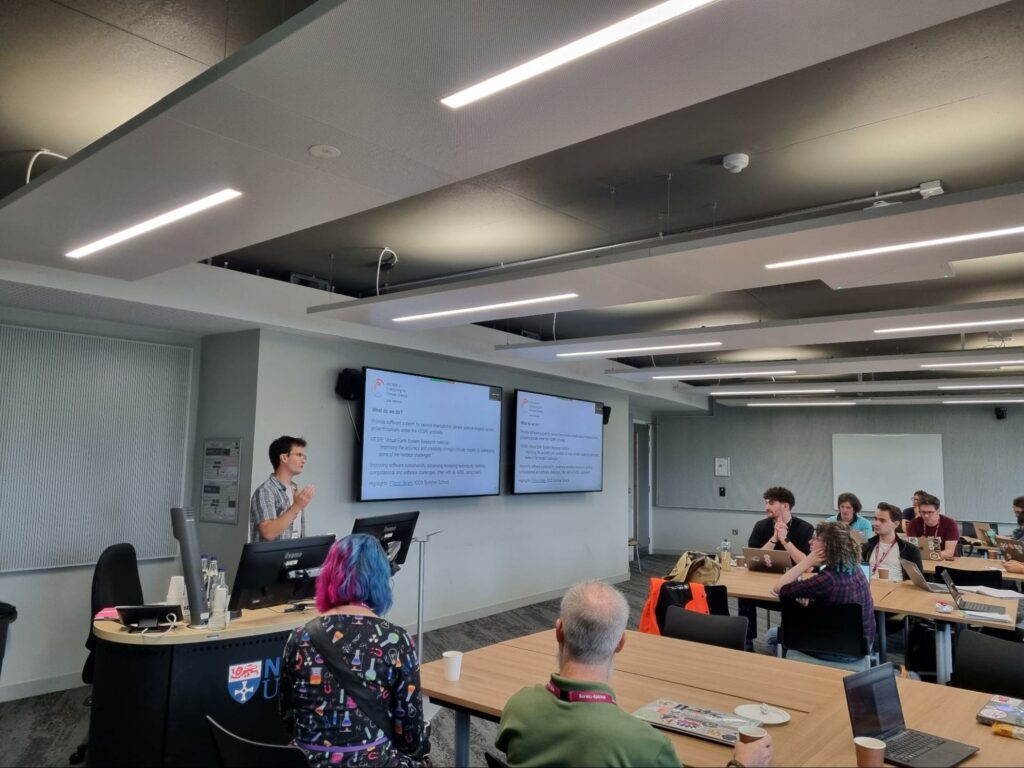
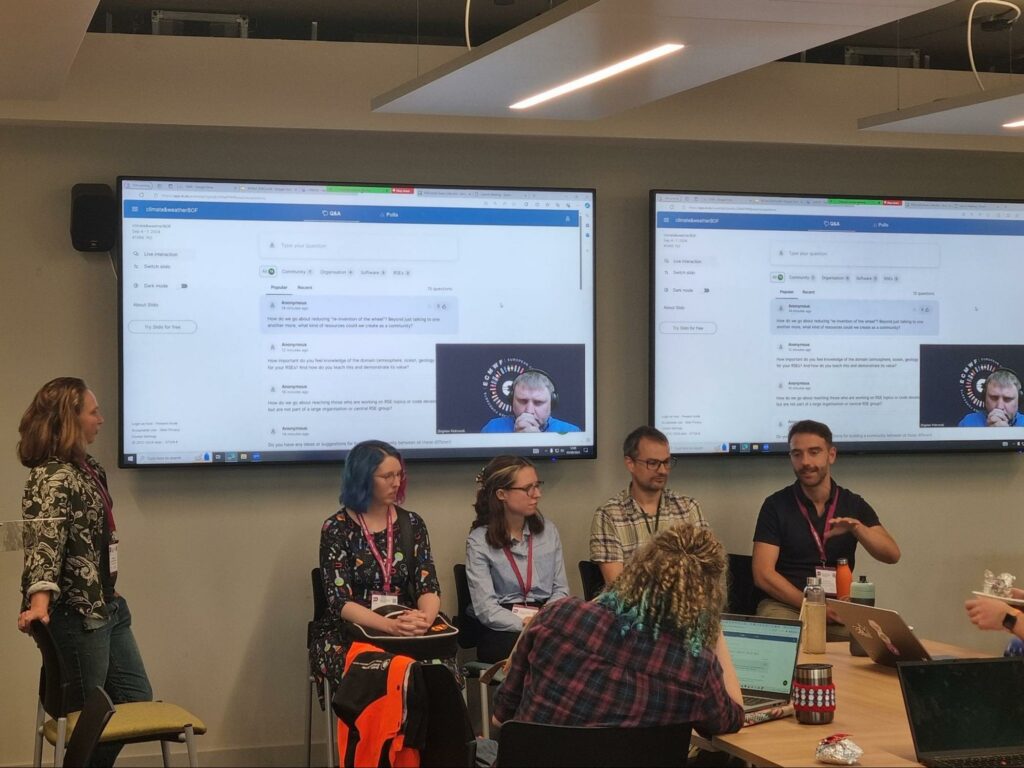
With around 40 people in the room and a couple online (some of them leaving when at the words “and now we go into breakout rooms”, but that’s what we expect) we had a reasonable group together to do this.
Invited talks
The session began with a set of invited lightning talks from a number of larger research organisations with research software engineering teams: The Meteorological Office in the UK (Met Office), the National Centre for Atmospheric Science (NCAS), National Oceanography Centre (NOC), British Antarctic Survey (BAS), UK Centre for Ecology and Hydrology (UKCEH), Institute of Computing for Climate Science (ICCS) from the University of Cambridge, and Centre for Environmental Modelling and Computation (CEMaC) from the University of Leeds, Plymouth Marine Laboratory (PML), and the European Centre for Medium Range Weather Forecasts (ECMWF).
These groups are based across the UK, with ECMWF also having several international locations, and do pivotal work throughout the geosciences domain. CEMAC is akin to “embedded RSE group” (six staff) but is often viewed as a post-doc pool by the academics developing proposals.
Key to this session was that we invited practising RSEs to provide an insider’s perspective into the work they do. Each talk focussed on key discussion points:
- What does our organisation do?
- How do our RSEs work?
- What tools and approaches do we use?
- What do we want from a community?
The objective was to start the session by showing what larger communities already exist in this space, what they have in common, as well as their diversity, and what is important to them.
Similarities noted across the briefings from each group included:
- Common RSE tooling was in use by all organisations – Git, GitHub/Lab, Python, Fortran, C++, netCDF, Xarray, etc.
- All centres had RSEs that supported the use of large computational models for researchers, but other applications varied greatly.
Key differences included:
- Some teams have been running (in some form) for many years and are large (~130 at the Met Office) whilst others have only been established in the last few years and may have 10 or fewer members.
- RSE teams in the national organisations may support not only computation-based research, but also fieldwork. For example, both BAS and NOC have research vessels, and NCAS have observational aircraft.
- Project allocations varied between dedicated work on long-term projects for an organisation vs. regular resource allocation bids from partners/external sources.
- Some RSEs are closer to the science they work with, whilst others may be more removed, focussing on non-scientific aspects. The latter typically in larger organisations.
Finally the most desired things from a community were:
- Opportunities to share knowledge between organisations, break down silos, and collaborate.
- Better guidance on career pathways, particularly for those committed to this domain.
- Coming together to collectively advocate for better software practices within organisations and across the domain.
As a quick note we acknowledge that this section did not directly involve the many embedded RSEs and researchers that exist in this domain. We hope that this showed these individuals what organisations exist and where they can reach out to, but they also had an opportunity to share their experiences and desires in subsequent sections of the workshop.
Slides from the session are available at WCBoF_RSECon24.
Panel Discussion
Our panel members were: Emma Hogan (Met Office), Ben O’Driscoll (PML), John Stevenson (BGS), Zbig Piotrowski (ECMWF), Sadie Bartholomew (NCAS). We tried to include some diversity in organisation type, size and geographical location without making the panel too unwieldy as size. After brief introductions on everyone’s role within their organisation we moved on to an audience led Q&A using slido, allowing audience members remote and in-person to ask anonymous questions and upvote popular questions. The audience responded enthusiastically asking 18 questions and 27 people out of the 44 people that logged on to slido either asked a question or contributed to voting. We only had time to answer 4 questions:
How important do you feel knowledge of the domain (atmosphere, ocean, geology etc.) is for your RSEs? And how do you teach this and demonstrate its value?
This question showed quite a difference depending on your role, with ECMWF mentioning that it was often essential to have some foundational level knowledge and other institutes having either the opportunity to learn on the job or roles where it was not required. Not all of our panellists came from a meteorological or geological background.
How do we go about reducing “re-invention of the wheel”? Beyond just talking to one another more, what kind of resources could we create as a community?
This provoked talk of better collaboration and provided a bit of a chuckle at the well known competing meteorological Python tools developed by NCAS and the Met Office that provide very similar functionality.
How can we enter or move between careers in some of these institutes – they often seem very closed?
Emma Hogan gave a good overview of career paths within the Met Office, as for how you might start a career in one of the larger institutes like the Met Office or ECMWF the advice was to keep an eye out for jobs advertised and once within the organisation there would be possibilities to progress or move between roles.
What training would be useful? Both training for RSEs and delivered by RSEs.
For this question it was clear that RSEs all deliver a lot of training both within their institutes and externally e.g. NCAS delivers training nationally. There was perhaps less talk of training received by RSEs; could this be done via knowledge shares between organisations?
There was much more that could have been discussed but unfortunately not enough time for this. We hope that the questions will be used to inform future events for our community.
Breakouts
Prior to the session, participants were given the opportunity to vote in a survey of possible topics of discussion as well as to suggest others. On the day, participants self-organised around those topics, ordered by popularity, as well as suggesting new ideas for discussion.
On the day, breakout groups were formed around 4 questions:
- How can we facilitate knowledge exchange?
- How can we be both a researcher and an RSE in this field?
- How can the various groups and research institutes collaborate?
- Do we want to form a Special Interest Group?
The first group discussed how to facilitate knowledge exchange around lots of environmental organisations and academic researchers, identifying existing initiatives such as EDS book, Earth Lab and Climate Estimate. Ultimately deciding that a new channel in the RSE slack would go a long way to facilitating knowledge exchange, and created it on the day, which has gone on to coalesce with the #geoscience community there. The Outcomes section below provides more information.
Perhaps inspired by Jack Atkinson’s emerging voice talk, one group discussed the challenges of how to be both researchers and RSEs at the same time within this field. They reflected that there’s a continuum between research and RSE on which anyone can exist in different ways. A big challenge that they identified was the ever-present issue of money, proposing approaches such as some internal funding used at BGS including a 5-day fund for people to work on writing papers, or a 100-day grant which could be used to advance in this area. On a larger scale, RSEs could be written into grant proposals, or even apply for gap-bridging fellowships such as those offered by EPSRC.
Collaboration between institutes was the topic for the third group, who observed that whilst there are existing collaborations such as MOAP which funds several professorships at universities, there are some barriers to cross-institution collaboration such as competition in weather forecasting. Positive initiatives proposed include introduction of satellite meetings for RSE at existing large meetings such as EGU as well as special interest groups.
Speaking of a special interest group (SIG), this was the topic for the final group who decided that a SIG would be a good way of creating greater visibility for the community and perhaps would help with connecting with academics and embedded RSEs who may not consider themselves an RSE.
Outcomes
One immediate outcome of the session was a new #weather-climate Slack channel that anyone on the UK RSE Slack can join. After some discussion about renaming and a subsequent survey, it was decided that #geoscience is a better name to represent the community.
Anyone interested in staying in touch with our community can sign up for a mailing list here: https://forms.gle/8ziSNyEZQBxgMvog8, and also indicate whether they are interested in being active on the organising side of things. We are happy to report that we do not only already have 37 sign-ups, but also a significant number of people volunteering to put their time into the building of this community! We have contacted those, and will have our first next-steps meeting soon.
In the breakout discussions it came out that the founding of a SIG under the RSE Society is something people are interested in and we should strive for, and that there is a small handful of people who would take that on. The necessary steps and paperwork for this were already identified, and some ideas for a structure discussed.
This SIG will then take on the organisation of future meetings – this can be regular meet-ups, sub-groups with particular scientific, technical or community focus, hackathons, the organisation of the next birds of a feather session at RSECon25, etc. It will also decide on other actions to be taken in the group to further build and support the community and exchange knowledge.
Hopefully, the seedcorn for a community was laid here, and those involved will let others know and bring them along. In addition, a web presence and social media activity should be set up so that others learn about the climate and weather RSEs community. In particular, we would like to find and support embedded (and potentially isolated) RSEs working in the domain.
Author affiliations
1 Institute of Computing for Climate Science, University of Cambridge, United Kingdom. 2 British Antarctic Survey, United Kingdom. 3 The Met Office in the UK, United Kingdom. 4 University of Edinburgh, United Kingdom. 5 Software Sustainability Institute, United Kingdom. 6 Centre for Environmental Modelling and Computation, School of Earth and Environment, University of Leeds, United Kingdom. 7 National Centre for Atmospheric Science, United Kingdom. 8 University of Reading, United Kingdom. 9 National Oceanography Centre, United Kingdom


